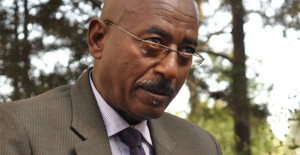
(AA) – As Ethiopians prepare to cast ballots in Sunday parliamentary and municipal polls, ethnicity and political ideology are the two principal routes by which contending political parties seek to win over voters.
Main opposition parties criticize the use of ethnic-based federalism to woo voters, warning that such a policy is counterproductive.
However, the ruling Ethiopian People’s Liberation Front (EPRDF) – a coalition of four main ethnically organized parties – says ethnic-based federalism will remain a pillar of its philosophy by which equality can be assured among the country’s various ethnic groups.
The EPRDF took power in 1991 after a 17-year guerrilla war against the Derg regime, which, the party believes, was caused by ethnic inequality that led it into a protracted struggle initiated by Tigray People Liberation Front (TPLF).
Main opposition parties – including the Blue Party (Semayawi), the Unity for Democratic and Justice Party (UDJP) and the Ethiopian Democratic Party (EDP) – say that ethnic-based federalism and parties organized along ethnic lines aren’t suitable to contemporary Ethiopia.
“Ethnic federalism hurts patriotism and sentiments of nationalism,” Blue Party spokesperson Yonatan Tesfaye told Anadolu Agency.
“It [ethnic federalism] is a threat to the right of free movement from territories of one ethnic group to the other within the country,” he said.
“Ethnic-based federalism impedes people’s integration,” Yonatan asserted.
He argued that ethnic arrangements would cast a shadow over internal economic integration and threaten national unity.
He said his party, which portrays itself as a promoter of liberal democracy, would consider a form of federalism that considers the psychological makeup of the people and the geographical location with a view to dividing areas into two administrative regions.
-Ideologies-
UDJP President Tigistu Awelu said that ethnic federalism was the philosophy of ruling EPRDF.
“But this is not feasible when it comes to ruling over the people,” he told Anadolu Agency.
He said the advocacy of ethnic federalism by the ruling EPRDF “had been an essential means of ending the Derg regime”.
“But it should not be applied to govern over the people,” he said.
Tigistu said that the electoral competition would be based on ideology.
“A party will lead a country by ideology as there are ways for members of many ethnic backgrounds will converge to a certain political ideology,” he said.
“We acknowledge ethnic identity, but when it comes to leading the country, divisions along ethnic lines don’t work,” he said.
According to Tigstu, running for election based on ideology will help win over voters – irrespective of their ethnic and religious backgrounds.
Chane Kebede, leader of the Ethiopian Democratic Party, criticized both the ruling party and the opposition for organizing themselves along ethnic lines.
“A large number of opposition parties organized along ethnic lines are direct imitators of the ruling party’s ethnic principle,” he said.
He said the philosophy of many opposition parties was similar to that of the ruling party.
“It [the ruling party] facilities their formation to ostensibly showcase a multiparty system,” he said.
He added: “They [parties organized along ethnic lines] are fringe and can’t have a capacity to form a new government, even if they are fortunate to win votes.”
“They should be changed into a multi-ethnic ideological political stance, so that they will be able to win power,” said Chane.
-Equality-
But Desta Tesfaw, external relations head for the ruling EPRDF, finds no problem with ethnic-based federalism.
“Ethiopian ethnic federalism is formed in consideration of the will of the country’s more than 80 ethnic groups,” Desta told Anadolu Agency.
“Ethnic-based federalism is ideal to accommodate diversified ethnic and religious societies,” he said.
According to Desta, under previous Ethiopian regimes, there had been preferential treatment on the basis of ethnicity and religion.
“With this type of federalism, the ruling party ensures equality among ethnic groups and effectively handles differences with equitable shares of wealth,” he said.
He believes that ethnic-based federalism is an ideal political administrative system for addressing Ethiopia’s various problems.
“This type of federalism will help foster integration among peoples and guarantees free movement across the country’s territories,” he said.
Ethiopia will hold its fifth parliamentary election on Sunday, in which 58 parties will vie for 547 seats in the House of Peoples’ Representatives, as well as for seats on the country’s regional councils.
Some 36.8 million Ethiopians are registered to cast ballots.
The ruling EPRDF arranged – and won – the last four Ethiopian general elections, the first of which was held in 1994.
In 2010 polls, the ruling party managed to win 99.6 percent of the seats in the federal parliament.